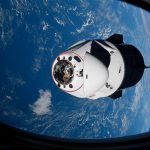At 11pm, the beach party is in full swing on the tropical island of Hainan.
Some sit under palm trees, others tend to the barbecue, but most of the crowd are gathered in a circle, waving Chinese flags and joining along as the band loudly play ‘Me and my Homeland’ – a traditional patriotic song that has been repeated approximately 17 times tonight.
In the distance, spotlights illuminate the launchpad where a Long March rocket waits, ready to blast off into space.
Welcome to Wenchang, China’s Cape Canaveral.
In a country that guards its sensitive installations closely, the beach here is a rare exception. A few hundred people are gathered here – locals, rocket enthusiasts and tourists who have taken an interest.
They are kicking back on the sand, having a bite to eat, and looking forward to watching China take its next step in a new space race.
“China’s space capabilities have increased a huge amount over the last few decades,” Alexandra Stickings, a research fellow in space policy and security at RUSI, tells Sky News.
“In terms of numbers of active satellites and launches, which are able to do independently, they are considered to be a Tier 1 space power, alongside the US and Russia.”
They feel that with some pride in Wenchang. Mrs Lin, a young woman who lives in Haikou, the nearest big city, came here “just to have the experience”.
“It’s a patriotic thing to do,” she tells Sky News. She also thinks the launch date, on a Chinese equivalent of Valentine’s Day, is romantic.
Others have come further. Mr Liu, from Guangxi province in the mainland, is here “to watch our country’s technological achievement”, saying: “Our country is so great.”
The Liu family are tourists, too – grandmother, mother and son. The grandmother tells Sky News: “I wanted to watch the amazing scene on the ground and I want my son to see it too.
“Before we watched it online. But this time, we wanted to come here to watch it.”
The Long March rocket is carrying the Tianzhou cargo craft, which will ferry supplies to China’s new space station.
The whole array will be assembled by the end of next year – a significant step in China’s space ambitions.
Mr Wang, a student in Hainan and an astronomy enthusiast, tells Sky News that he’s very proud.
“Think about the past. China planned to join the International Space Station but other countries didn’t want us. But now our country is stronger and I believe it will be even more powerful with time. Long live our country,” he says.
China is certainly flexing its muscles. Alongside the space station, this month it landed a rover on Mars, becoming only the second country to do so.
It’s now completed its Beidou navigation satellite network, a rival to the American GPS. And it’s made several trips to the moon, even announcing plans with Russia to build a permanent, crewed moon base.
In 2018, it launched more spacecraft than any other country.
“There are huge economic benefits to operating in space,” Stickings tells Sky News. “Space systems support a wide range of industries, and also plays a role in China’s soft power. There is also a sense of success in space translating to a global standing.”
It brings hard power, too.
“There are a number of military applications of China’s space program,” according to Stickings. “It is increasing its communications and intelligence, surveillance and reconnaissance capabilities in space.
“China has also been developing a range of counter-space capabilities to destroy, disrupt and deny space assets, ranging from kinetic anti-satellite missiles to cyber attacks to non-kinetic measures such as lasers that can blind satellites.”
Please use Chrome browser for a more accessible video player
As its ambitions expand, the country has also earned criticism.
After its previous launch, parts of the Long March rocket fell back to earth out of control, potentially landing anywhere – action that NASA said was irresponsible.
At a briefing in Beijing, Zhao Lijian, a spokesperson for the ministry of foreign affairs, curtly told Sky News those claims were baseless.
In the coldness of space, there is now fierce competition.
On the beach of Wenchang, though, in the early hours of the morning, with the still-warm breeze ruffling the palm trees, it’s all rather more relaxed.
Close to 1am now, people are now making their way to the main stretch of beach, opposite the launch site.
There’s a quiet buzz. The rocket has been fully fuelled.
Amateur photographers are setting up some serious camera rigs. A tour group wearing matching caps sits in neat rows on small plastic stools they have brought with them.
Then the rumour goes around: the launch has been cancelled. Some people start to leave but others stay.
Eventually, local Hainan TV, controlled by the state, confirms the launch has been scrubbed. Finally, the police order everyone to leave the beach, and the evening is over.
There’s little frustration, though. The crowd pack up and go home, happy enough with the evening’s entertainment, even without a spectacular climax.
They know there will be plenty more launches for them to watch.






















